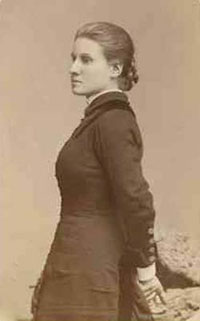| |
| |
|
Annie
Jane Duncan
1858 -
1943
|
|
by Kay Daniels
|
|
|
|
DUNCAN,
ANNIE JANE (1858-1943), factory inspector, was
born on 25 September 1858 at Port Adelaide,
South Australia, elder daughter of Handasyde Duncan,
physician, and his second wife Anne (d.1861),
née Williams. After the death of her mother and
stepmother, Annie and her sister Mary were
brought up and educated by female servants and
relatives.
|
|
From
16 Annie kept house for her father; he died in
1878 and left her a small annuity. She went to
live with an aunt at Dashwood Gully and shared
the fashionable activities of girls of her
class: singing and dancing lessons, archery,
spending her dress allowance, and amateur
theatricals, but did not take her admirers 'very
seriously'. On 27 December 1884 Mary married
Arthur Hammerton Champion, soon to become
headmaster of Launceston Church Grammar School,
Tasmania. When her sister became a semi-invalid,
Annie joined their household and took charge of
the kitchen and mending.
The depression of the early 1890s changed Annie
Duncan's life-style, and in 1893 she travelled
abroad: in London she realized that she would
have to seek work or return home. Through an
introduction to Lucy Deane, one of the first
female inspectors of workshops in England, she
took courses with the National Health Society
and the (Royal) Sanitary Institute. In April
1894 she passed the examination for inspector of
nuisances and was appointed to the South
Kensington district. She found her new life 'in
the ranks of workers' enthralling and that 'a
sisterhood' opened up to her. She mixed with
women in similar occupations such as Rose Squire
and Adelaide Anderson and met Beatrice and
Sidney Webb. When her appointment was not
renewed she travelled in Europe then returned to
Australia.
On
8 February 1897 Duncan was appointed factory
inspector in the labour and industry
branch On 8 February 1897 Duncan was
appointed factory inspector
|
| |
Annie Jane Duncan (1858
- 1943), by Dobson & Co., c1883,
courtesy of State Library of South
Australia. SLSA: B10480 .
|
|
|
in
the labour and industry branch of the New South
Wales Department of Public Instruction under the
Factories and Shops Act of 1896; she was
promoted senior inspector in 1912. Her ability
to create in a few words a sense of the plight
of individual women in factories, laundries and
workrooms, or to express the misery of
homeworkers in the clothing trade made her
reports a striking record of contemporary social
conditions. In 1904 she contributed an article,
'Women's place in the industrial world', to the
Public Service Journal.
Unequivocally condemning filthy and overcrowded
working conditions, Duncan argued that an
appointment of a female doctor to the factory
department would be 'invaluable not only in
eliminating work which is absolutely poisonous
or dangerous, but also in eliminating all
conditions which are unfavourable to health'. In
politics she was conservative and was
particularly unsympathetic to the industrial
policies of the State Labor government. She
increasingly believed that her position in the
Department of Labour and Industry was undermined
by her lack of enthusiasm for the Labor Party.
She retired in 1918.
Duncan was a practising Anglican and a member of
the Women's Auxiliary of the Australian Board of
Missions and the Girls' Friendly Society. In the
early 1900s she was involved in the National
Council of Women of New South Wales, enlisting
its support in her fight against industrial
disease, and was a founder of the Business and
Professional Women's Club of Sydney and a member
of the Women's Club. In the 1920s she travelled
in Australia and overseas. On her return in 1930
she lived in Adelaide where she was a member of
the Adelaide Music Salon, the Alliance
Française, the Victoria League and the Lyceum
Club. In 1937-40 she lived in a boarding house
at Kings Cross, Sydney, a way of life she found
congenial, but returned to North Adelaide in
1940.
Annie Duncan died in hospital at College Park on
13 September 1943. She had seen herself both as
a precursor in her profession in England and
Australia, and a pioneer career woman among
those of her social standing in New South Wales.
Her estate was valued there for probate at
£2565, and £169 in South Australia.
|
| |
Acknowledgements:
Kay Daniels,
'Duncan, Annie Jane (1858 - 1943)', Australian
Dictionary of Biography, Volume 8, Melbourne
University Press, 1981, pp 366-367.
|
|
|
|

